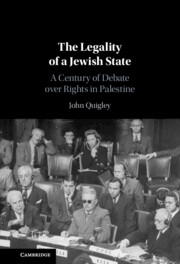Book contents
- The Legality of a Jewish State
- The Legality of a Jewish State
- Copyright page
- Contents
- Figures
- Preface
- United Nations Entities
- Abbreviations
- Frontispiece
- Part I Battalions or Barristers
- Part II A Pair of Godfathers
- Part III A Flight from Justice
- Part IV From the Ashes of War
- Part V Whose State?
- 17 Did the Palestine Mandate Survive the League of Nations?
- 18 Did the United Nations Inherit a Power to Partition Palestine?
- 19 Did the United Nations Have a Power to Partition Palestine?
- 20 Was the Future Government Resolution Binding?
- 21 Was Partition of Palestine Fair?
- Part VI Jewish Statehood on the Ground
- Part VII Legitimacy in the New Century
- Notes
- Select Bibliography
- Index
19 - Did the United Nations Have a Power to Partition Palestine?
from Part V - Whose State?
Published online by Cambridge University Press: 09 December 2021
- The Legality of a Jewish State
- The Legality of a Jewish State
- Copyright page
- Contents
- Figures
- Preface
- United Nations Entities
- Abbreviations
- Frontispiece
- Part I Battalions or Barristers
- Part II A Pair of Godfathers
- Part III A Flight from Justice
- Part IV From the Ashes of War
- Part V Whose State?
- 17 Did the Palestine Mandate Survive the League of Nations?
- 18 Did the United Nations Inherit a Power to Partition Palestine?
- 19 Did the United Nations Have a Power to Partition Palestine?
- 20 Was the Future Government Resolution Binding?
- 21 Was Partition of Palestine Fair?
- Part VI Jewish Statehood on the Ground
- Part VII Legitimacy in the New Century
- Notes
- Select Bibliography
- Index
Summary
A power on the part of the General Assembly of the United Nations to decide on a partition of Palestine was said to flow from the text of the Charter of the United Nations. The Charter, however, gives the General Assembly decision-making powers only with respect to issues internal to the United Nations. It was argued that the member states construed the Charter so as to give it a power to partition Palestine. In response, it was argued that the member states did not do so. Many of them wanted the International Court of Justice to decide that point. It was argued that even if the Charter did not explicitly give a power to partition Palestine, such a power was implied by the Charter. In response, it was argued that there was no basis for such an implication.
- Type
- Chapter
- Information
- The Legality of a Jewish StateA Century of Debate over Rights in Palestine, pp. 153 - 160Publisher: Cambridge University PressPrint publication year: 2021

